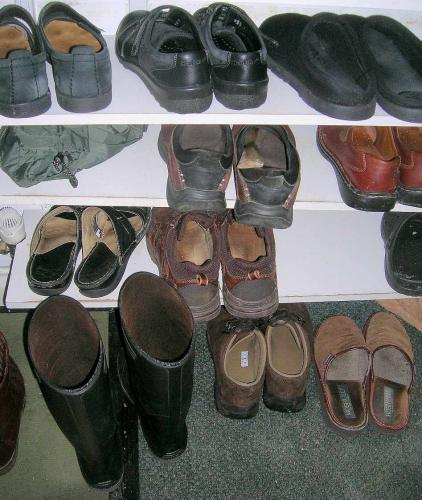In her ‘spare time’ Karen continues to reflect on her marriage, whilst in the midst of the ‘grit and joy’ of her daily life. These words are published here because they reflect a depth of devotion and firmness of commitment, on both her part and her husbands. They have left their front door open for us to walk in through. I bow to that generous offer. And respect it.
See also Karens first post in this series, Up Against It…
Writing is an interesting process. I think it may be different for different people but right now, for me, it is part of a gentle, inner turning; a kind of song that needs to be sung. I do hope the reader won’t mind if I sing it.
I look at my little altar, across the room and my eye rests upon the photograph in its pewter and turquoise frame. I am drawn into the scene; David stands tall, though bowing his head slightly to his right to meet with mine, the top of which just meets with the bottom of his chin. We pose for the photographer; it is our daughter’s graduation celebration. He looks strong and young, belying the slow creeping of rheumatoid disease within.
I once heard a doctor describe rheumatoid as ‘cancer of the joints’. This is an apt description, I think, though an emotive one. I can barely remember a time when he didn’t have it.
But there was a time………
They say that opposites attract and there are all sorts of reasons, both practical and spiritual, why that is often a good thing. Speaking for myself, I saw in David, many qualities that I searched for within myself- steadiness and ‘stickability’ being two of them. For as much as David was a ‘steady sort of guy’, I was, quite frankly ‘a bit of a dreamer’. I loved to dance; he loved to sit in the corner with a book and, dare I say, a pint of good ale. On the other hand, I’m up for a bit of ‘risk taking’ whilst David prefers ‘safe ground’. Living together for 33 years has had the effect of ‘evening things out a bit’. There has been a necessary ‘meeting in the middle’, which feels like a positive.
Though we were both born and bred in Shropshire, we had quite different upbringings. David was the son of a police sergeant and his Irish Catholic wife, Kathleen, who took up several country beats, in his career, requiring the whole family to move, sometimes at short notice. David was born in Cleobury Mortimer but lived for the majority of his childhood in Bucknell – Welsh border country – acquiring a thick, regional accent that sounded like a foreign language to the inhabitants of Bridgnorth, where the family eventually settled. He was the eldest of four children and although money was often ‘tight’, he recalls the strength and security of being part of a large, close-knit family. He has many happy memories.
I, on the other was born in Bridgnorth to a carpenter, turned insurance salesman and his land girl wife. My parents always dreamed of farming the land together and raising pigs and geese. They moved someway to fulfilling this dream by renting a small holding, keeping livestock and breeding dogs. The ‘dream’ however, was stinted, when the marriage ended after only eight years, leaving my mother a single parent to my sister and me. I too was the eldest child. I too have happy memories and many sad ones, also.
These two childhoods were very different, in many ways but there were three distinct similarities. Firstly, there was a sense of the nomadic about them. For, as David’s parents were compelled to move frequently because the life of a country ‘bobby’ dictated it, so my mother, searching for work, a sense of stability and a glimpse of happiness, also moved from place to place trying to find it.
Secondly, as eldest children, we both bore the mark that many first children have; an overburdening sense of responsibility. This sense of responsibility, intertwined with the accompanying fear, has been the ‘root’ of much individual suffering, for both of us.
Thirdly, and most importantly, from our very first memory we have both had a sense of something greater than ourselves and both sought to understand and ‘serve’ it. In youth, David was an altar boy in his local Roman Catholic church, though he talks of his most ‘spiritual experience’ being sitting quietly, on his front doorstep, with the family spaniel, listening to the wind. Likewise, a regular in church, until my mother was told she wasn’t welcome for divorcing my father, my most transcendental moments have been those spent in solitude, ‘sitting’ quietly with nature, in my childhood tree house, the local woods and fields or by the brook.
By spring, 1975, both sets of parents had settled into a semi-permanent residency. David’s family lived in a residential area of Oldbury Wells, on the outskirts of Bridgnorth town. Whilst my mother, after ‘uping sticks’ and moving several times, had by now ‘settled’ in a cedar wood bungalow in the more rural area of Oldbury. Though we had no knowledge of each other, all that separated us was a field, a church and a short section of road. Soon those three features would be most significant in our lives. We would ‘court’ in the field, marry in the church and a late evening walk along the road would result in an accident that would impact on our lives, long after skin had healed and bones were mended. But that is for another time, perhaps, not now; for the light is creeping in around around the edges of the room. I can hear David, in his converted garage, downstairs, moving a glass, taking his ‘pills’, it’s time to get up and start the day……….
